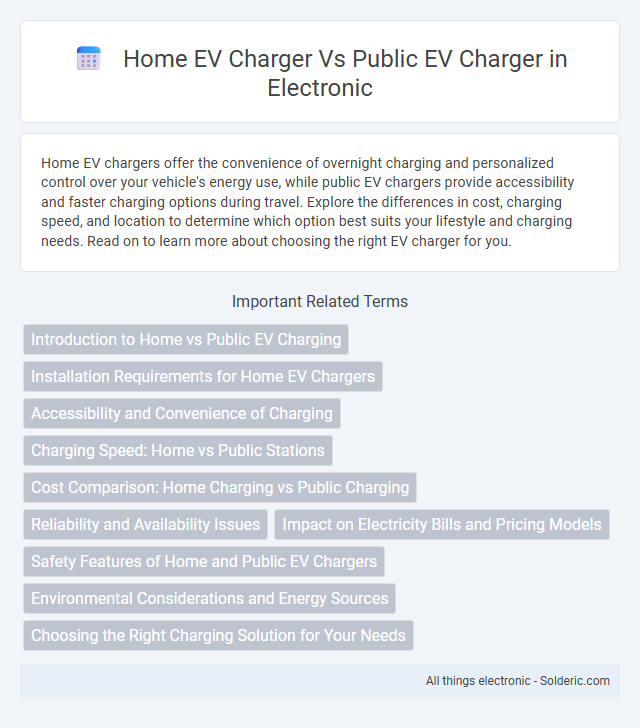Home EV chargers offer the convenience of overnight charging and personalized control over your vehicle's energy use, while public EV chargers provide accessibility and faster charging options during travel. Explore the differences in cost, charging speed, and location to determine which option best suits your lifestyle and charging needs. Read on to learn more about choosing the right EV charger for you.
Comparison Table
| Feature | Home EV Charger | Public EV Charger |
|---|---|---|
| Location | Residential property | Parking lots, commercial areas, highway stops |
| Charging Speed | Typically 3.7kW to 22kW (Level 2) | Varies: 7kW to 350kW (Level 2 to DC fast charging) |
| Accessibility | Exclusive access for owner | Available to all EV users |
| Cost | Initial installation cost; electricity at residential rates | Pay-per-use; sometimes free; higher rates than home charging |
| Convenience | Highly convenient; charging overnight | Good for quick top-ups; limited by location and availability |
| Power Source | Integrated with home electrical system | Connected to commercial or utility grid |
| Installation | Requires electrician; permits often needed | No installation needed by user |
Introduction to Home vs Public EV Charging
Home EV chargers offer the convenience of overnight charging, allowing your electric vehicle to be fully powered by morning using standard or fast chargers installed in your garage or driveway. Public EV chargers are strategically located in places such as shopping centers, parking lots, and along highways, providing accessible charging options during travel or daily errands. Choosing between home and public EV charging depends on your driving habits, access to charging infrastructure, and the required charging speed for your electric vehicle.
Installation Requirements for Home EV Chargers
Home EV charger installation typically requires a dedicated electrical circuit, often a 240-volt outlet, and may involve upgrading your home's electrical panel to handle the increased load safely. Proper wiring and compliance with local electrical codes are essential to ensure reliable and safe operation of your charger. Choosing a professional electrician for installation ensures your home EV charger functions efficiently and meets all safety standards.
Accessibility and Convenience of Charging
Home EV chargers provide unparalleled accessibility by allowing vehicle charging anytime without the need to travel, offering convenience tailored to individual schedules. Public EV chargers, while less accessible due to their fixed locations and potential wait times, provide essential options for drivers on long trips or those without home charging setups. The convenience of home charging significantly reduces the dependence on public infrastructure, enhancing daily EV usability.
Charging Speed: Home vs Public Stations
Home EV chargers typically offer Level 2 charging with speeds ranging from 3.7 to 22 kW, enabling an overnight full charge ideal for daily use. Public EV chargers, especially fast chargers like DC fast chargers, can deliver charging speeds of 50 kW to 350 kW, significantly reducing charging time during travel or emergencies. Your choice depends on convenience and speed needs; home chargers suit regular slow charging, while public stations excel in rapid replenishment on the go.
Cost Comparison: Home Charging vs Public Charging
Home EV chargers typically offer a lower cost per kWh compared to public charging stations, averaging around $0.12 to $0.20 per kWh versus $0.30 to $0.60 at public chargers. Installation of a Level 2 home charger involves an upfront cost between $500 and $2,000, but this investment leads to long-term savings and convenience. Your cost efficiency improves with home charging as you can maximize off-peak electricity rates, avoiding the premium pricing often found at public fast chargers.
Reliability and Availability Issues
Home EV chargers offer consistent reliability and immediate availability, ensuring your vehicle is charged overnight without waiting or site access concerns. Public EV chargers, while useful for on-the-go charging, may suffer from downtime, limited operational hours, or high demand causing wait times. Choosing home charging enhances your convenience and guarantees power when you need it most.
Impact on Electricity Bills and Pricing Models
Home EV chargers often use time-of-use pricing, enabling you to charge your vehicle during off-peak hours at lower electricity rates, significantly reducing your electricity bills. Public EV chargers typically operate on pay-per-use or membership pricing models, which may include higher per-kWh fees to cover infrastructure and maintenance costs. Understanding these pricing differences helps optimize your charging strategy and manage overall energy expenses effectively.
Safety Features of Home and Public EV Chargers
Home EV chargers offer enhanced safety features, including built-in ground fault circuit interrupters (GFCIs) and customized circuit breakers designed to match your home's electrical system, reducing the risk of electrical faults. Public EV chargers incorporate robust safety protocols such as real-time monitoring, automatic shutdown in hazardous conditions, and tamper-resistant designs to protect multiple users. Both types prioritize safety, but home chargers give you direct control over installation and maintenance standards.
Environmental Considerations and Energy Sources
Home EV chargers powered by renewable energy sources such as solar panels significantly reduce carbon emissions by utilizing clean energy directly from the home grid. Public EV chargers often rely on the grid's energy mix, which may include fossil fuels, resulting in a higher carbon footprint depending on the region's energy infrastructure. Selecting home charging paired with green energy options offers a more sustainable and environmentally friendly solution compared to many public charging stations.
Choosing the Right Charging Solution for Your Needs
Home EV chargers offer convenience, faster charging speeds with dedicated power supply, and cost efficiency for daily use, while public EV chargers provide accessibility and variety of charging levels essential for long trips or locations without private parking. Selecting the right charging solution depends on factors like driving habits, vehicle range, installation costs, and access to reliable electrical infrastructure. Balancing home charging benefits with public network availability ensures optimal EV usage and energy management tailored to individual mobility patterns.
home EV charger vs public EV charger Infographic

 solderic.com
solderic.com